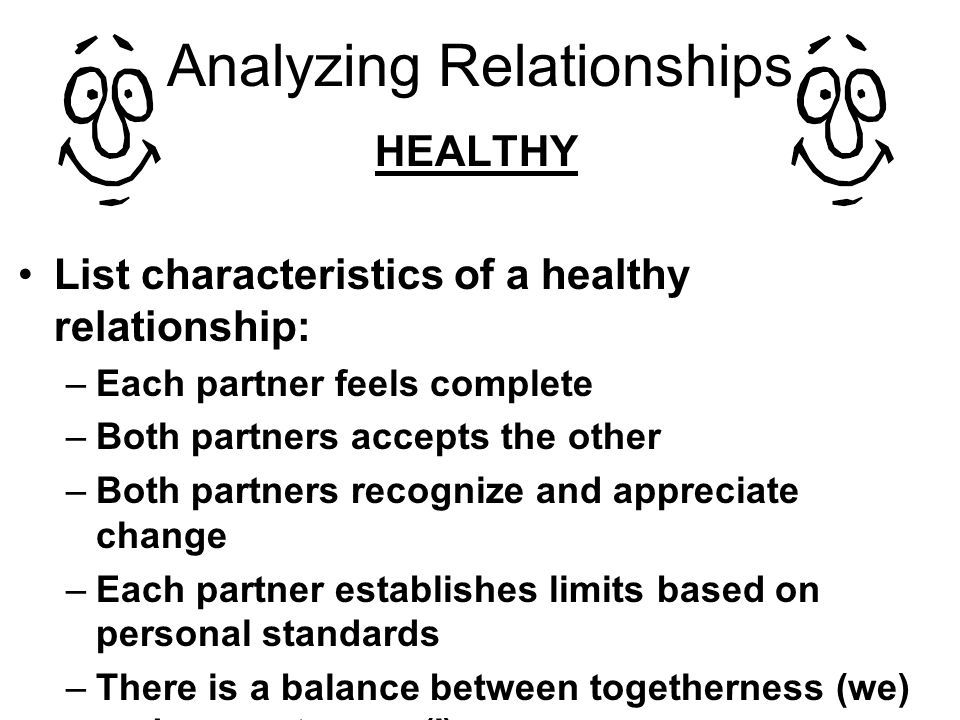
Characteristics of a healthy relationship and an unhealthy relationship
Автор: Jodie Nelson 17.12.2018Healthy vs. Unhealthy Relationships

❤️ : Characteristics of a healthy relationship and an unhealthy relationship
There are happy times, but there are hard times too. The qualities of a healthy or unhealthy relationship listed below apply to all types of relationships! Another one of the types of characteristics that may be a sign of an unhealthy relationship is emotional or mental abuse. We are helping other men start groups and develop deep friendships.

Mutual consideration means placing the needs and happiness of another on equal footing with personal well-being and concerns. One partner uses force to get his or her way such as hitting, slapping, grabbing, or shoving. Not having close friends since high school, I created a plan to develop them. Others will sense how you take care of yourself which sets them up to believe you could do it for them.

Healthy Relationships - Or Person A could be avoiding the fact that Person B is a workaholic.

Many times, these behaviors are used to gain power or control and can have a negative impact on your well being or day to day life. In some cases, these unhealthy behaviors can escalate to violence. If you feel like something might be off in your relationship, trust your gut and. JEALOUSY An emotion that everyone experiences, jealousy becomes unhealthy when someone lashes out or tries to control you because of it. Examples can be getting upset when you text or hang out with people your partner feels threatened by, accusing you of flirting or cheating, being possessive over you or even going so far as to stalk you. MANIPULATION When a partner tries to influence your decisions, actions or emotions. ISOLATION Keeping you away from friends, family, or other people. Examples can be when your partner makes you choose between them and your friends, insisting you spend all your time with them, making you question your own judgement of friends and family, and making you feel dependent on them for money, love or acceptance. VOLATILITY Unpredictable overreactions that make you feel like you need to walk on eggshells around them or do things to keep them from lashing out. Examples can be mood swings, losing control of themselves by getting violent or yelling, threatening to hurt you or destroy things, and making you feel afraid of them. This can also be lots of drama or ups and downs in a relationship. DEFLECTING RESPONSIBILITY Making excuses for their behavior. Examples can be blaming you, other people or past experiences for their actions, using alcohol or drugs as an excuse, using mental health issues or past experiences like a cheating ex or divorced parents as a reason for unhealthy behavior. Some of these characteristics may seem obvious to you, and some may make you think about how you can improve your own relationship, or help a friend improve theirs. We can all work to build healthier relationships, and it starts with education and conversations!
Healthy vs Unhealthy Relationships
When you and your partner are communicating, try to pan them feel justified in their emotions. Even when things are busy, you should take the time to check in with each other at least once a day. However, harmful, violent actions such as those and repeated verbal negativity is abusive and not healthy in relationships — or solo. If you want a relationship that's strong like glue, you need to spend time together and nurture your connection. Then, keep using healthy behaviors as you continue dating. Forgiveness is an essential component of successful relationship conflict resolution, and once a partner agrees to forgive the u, the incident should no longer be a frequent point of contention. Laughter a social phenomenon opens us up. Each partner should speak honestly and openly to avoid miscommunication. Grabbing chocolate to satisfy a craving is one thing. And while it's fine to take a back seat once in con, people make time for priorities and in healthy relationships, both parties feel and share the value of being number one with one another.

